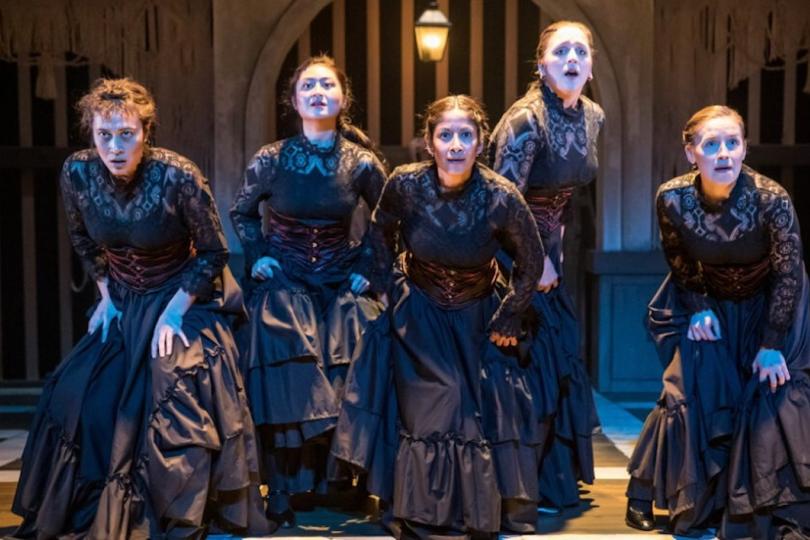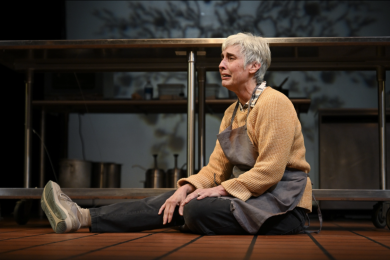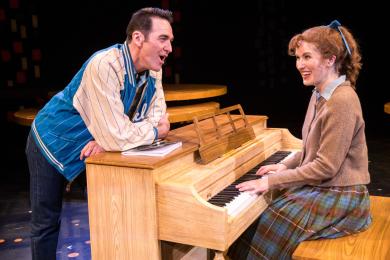Leave it to Women to do the Heavy Lifting

"Theatre is poetry that rises from the book and becomes human enough to talk and shout, weep and despair." -Federico García Lorca c.1936
In Bernarda Alba, a household of Spanish sisters, literally trapped in their house, are mourning the death of their nefarious and recently deceased father, and driving each other crazy! Under the watchful eye of the matriarch (turned patriarch), BERNARDA ALBA, they are suffocating and unraveling inside and out. At first I wondered WHY? Why are we doing another production of a dated play (or a musical based on a dated play) that depicts women as man-hungry, suppressed, jealous, and catty beings who cut each other down instead of lifting each other up? Isn’t now the time to band together? Women’s March! Support each other! “Chicks over…” yeah, yeah, you get what I’m trying to say. It’s great to find and produce a cast of all women, (and frankly a predominantly female production team thank you very much), BUT only to put these age old stereotypes on stage again? Why? Director, Crystal Manich, won me over almost instantly. Please take the time to read the “letter from the director” in the program, as she honestly and earnestly defends this choice to the enth degree. “Any women who find themselves to be the descendants of a staunch patriarchal mindset could, and do, experience a gross decay of their individuality. They turn on each other…(in this production) through their expressive songs seeking deep truth, we can perhaps understand the mechanism that produces this behavior.” Yes, women have been victims of a patriarchal society, but we are not without blame.
Theater Latté Da has pulled this production off with aplomb. Bernarda Alba, words and music by Michael John LaChiusa, (based on The House of Bernarda Alba by Federico Garcia Lorca), presents a bleak look at how women, within the confines of a patriarchal society, can be their own worst saboteurs. The production is stunning. Visually it reads as a sepia color pallet that supports the early 20th century time period, with splashes of bright colors woven in. (Think the little girl in the red coat a la Schindler’s List and keep your eye on the green dress.) The set, expertly executed by Kate Sutton-Johnson, has structure but malleability. In fact it has beautiful movement. On a practical level it’s hanging macrame sways with the actors' entrances and exits as if moving with a humid breeze. Then moves theatrically by changes the scenery completely, and it helps articulate musical numbers and some of the more surrealistic flashbacks. Kevin Springer’s sound design is the perfect, noninvasive peppering of ranch life and enhances the rural landscape with sounds of wood, wind, and the occasional horse.
The actors are fierce. All ten women (yes you read that right, ten women, and only women) have presence, unique characters, beautiful vocal skills and commitment to the dire reality of the imaginary circumstances. Regina Marie Williams is formidable as the title character. Strong, intimidating, with the tiniest cracks of vulnerability, Williams channels her inner Eartha Kit, and is not one to tussle with. You can see why the daughters (and terrified neighbor PRUDENCIA, a much needed comic cameo by Sara Ochs) are less than hesitant to incur her wrath. Other standouts are Meghan Kreidler as MARTIRIO (far too attractive to be touted the ugly duckling sister), who’s unrequited love and bitterness is palpable but relatable. She’s angry but doesn’t wallow, and is so dedicated to her truth that she’s not afraid to put her family at risk. ADELA, played by Stephanie Bertumen, is rambunctious and bratty as the youngest sister, but she is the only one allowing herself to dream of a better existence and she breathes life into the framework of the dusty house. Lastly Aimee K. Bryant, as the narrator and head servant PONCIA, is a delightful guide into the world by giving us the backstory with knowing humor and an eerie intuition.
Then there’s the music. All of these women should be commended for their specific character work that nevertheless results in a cohesive musical ensemble. Everyone is on the same page and telling us the same devastating story. Playwright/Composer, Michael John LaChiusa, discusses his musical choices with the Lincoln Center Review in 2006, and explains the influence of indigenous spanish folk songs that support the poetry of Lorca himself. “I wanted to...create an environment where anything that had to do with rhythm or percussion would be created with the palmas (claps) or compas (feet stomps), and from there, you go into the character’s heartbeat.” The expert musical direction by Jason Hansen uses the actors as the fore mentioned percussive instruments, and along with the unseen pit orchestra, they create an immersive musical experience. Complemented by Kelli Foster Warder’s animated choreography, the singing and music allow us eloquent access to the secrets these women are keeping from each other, and sometimes from themselves. It pushes the spotty plotline forward and it’s virtually impossible not to be engaged.
I’m not going to say this evening is a blast, it’s not, but this production is lovely, timely, and eye-opening. I’m leaving some things out to avoid “spoilers,” but the abrupt and shocking ending is enough of a payoff to commit to the ninety minutes without ANY background on the play, story, or newly repurposed musical. At the risk of turning myself into a kermit meme, this production is a rough reminder to “be kind, for everyone you meet is fighting a hard battle.” Whether it’s a complete stranger or someone you think you know better than anyone else, it’s important to listen; we should engage in empathy and compassion, even if our own hearts are at risk of breaking. Theater Latté Da, and all involved in Bernard Alba, should be applauded for making this show (and subject matter), entertaining, accessible and surprisingly relevant. See this show, talk about it afterwards, and keep that conversation going.




